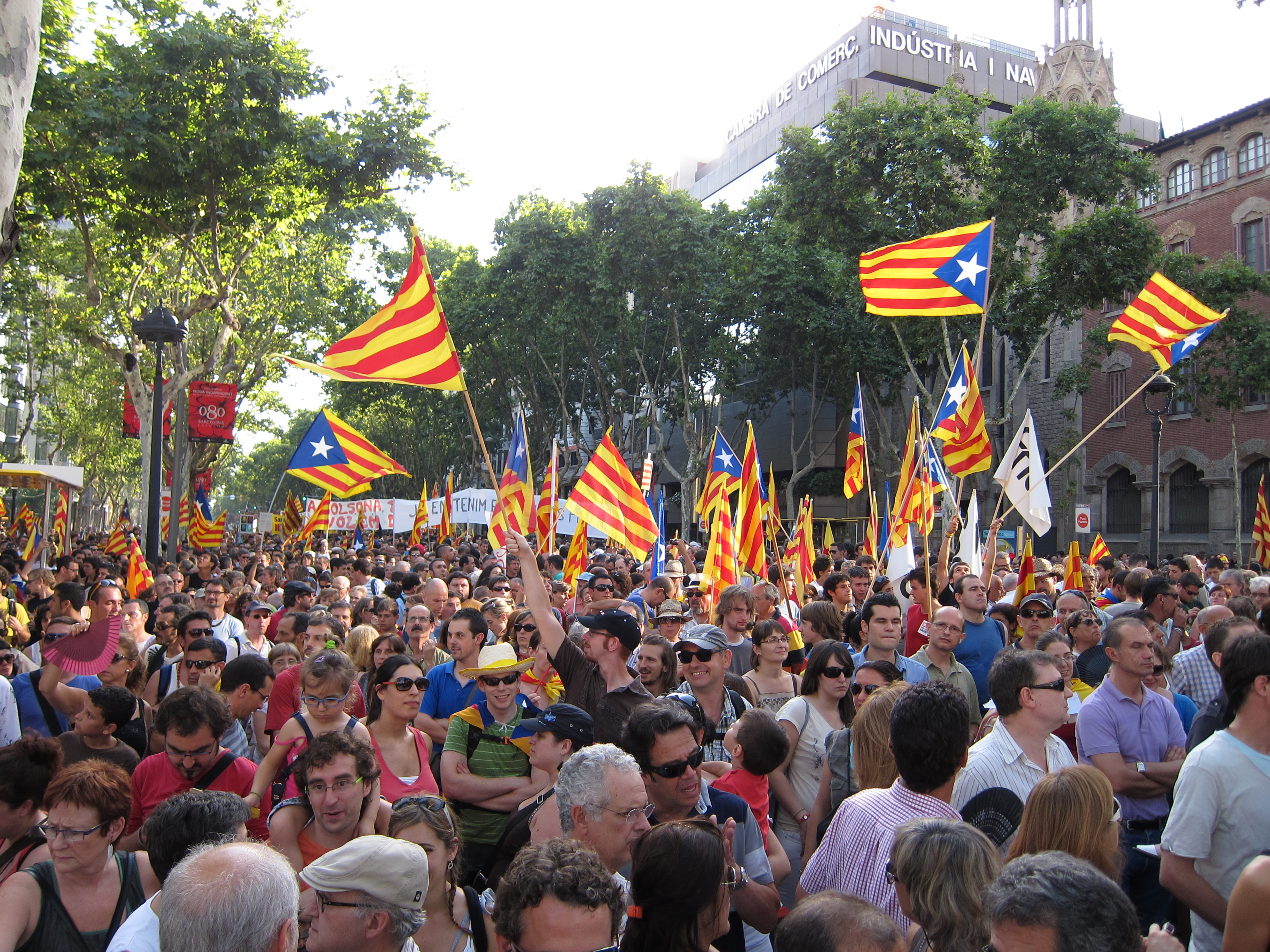|
Catalan Countries
The Catalan Countries ( ca, països catalans, , ) refers to those territories where the Catalan language is spoken. They include the Spanish regions of Catalonia, the Balearic Islands, Valencian Community, Valencia, and parts of Aragon (''La Franja'') and Region of Murcia, Murcia (Carche), as well as the Andorra, Principality of Andorra, the department of Pyrénées-Orientales (aka Northern Catalonia, including Cerdanya, Cerdagne, Roussillon, and Vallespir) in France, and the city of Alghero in Sardinia (Italy). In the context of Catalan nationalism, the term is sometimes used in a more restricted way to refer to just Catalonia, Valencia and the Balearic Islands. The Catalan Countries do not correspond to any present or past political or administrative unit, though most of the area belonged to the Crown of Aragon in the Middle Ages. Parts of Valencia (Spanish) and Catalonia (Occitan language, Occitan) are not Catalan-speaking. The "Catalan Countries" have been at the centre of ... [...More Info...] [...Related Items...] OR: [Wikipedia] [Google] [Baidu] |
Catalan Language
Catalan (; autonym: , ), known in the Valencian Community and Carche as ''Valencian'' (autonym: ), is a Western Romance language. It is the official language of Andorra, and an official language of three autonomous communities in eastern Spain: Catalonia, the Valencian Community, and the Balearic Islands. It also has semi-official status in the Italian comune of Alghero. It is also spoken in the Pyrénées-Orientales department of France and in two further areas in eastern Spain: the eastern strip of Aragon and the Carche area in the Region of Murcia. The Catalan-speaking territories are often called the or "Catalan Countries". The language evolved from Vulgar Latin in the Middle Ages around the eastern Pyrenees. Nineteenth-century Spain saw a Catalan literary revival, culminating in the early 1900s. Etymology and pronunciation The word ''Catalan'' is derived from the territorial name of Catalonia, itself of disputed etymology. The main theory suggests that (Latin ... [...More Info...] [...Related Items...] OR: [Wikipedia] [Google] [Baidu] |
Sardinia
Sardinia ( ; it, Sardegna, label=Italian, Corsican and Tabarchino ; sc, Sardigna , sdc, Sardhigna; french: Sardaigne; sdn, Saldigna; ca, Sardenya, label=Algherese and Catalan) is the second-largest island in the Mediterranean Sea, after Sicily, and one of the 20 regions of Italy. It is located west of the Italian Peninsula, north of Tunisia and immediately south of the French island of Corsica. It is one of the five Italian regions with some degree of domestic autonomy being granted by a special statute. Its official name, Autonomous Region of Sardinia, is bilingual in Italian and Sardinian: / . It is divided into four provinces and a metropolitan city. The capital of the region of Sardinia — and its largest city — is Cagliari. Sardinia's indigenous language and Algherese Catalan are referred to by both the regional and national law as two of Italy's twelve officially recognized linguistic minorities, albeit gravely endangered, while the regional law provides ... [...More Info...] [...Related Items...] OR: [Wikipedia] [Google] [Baidu] |
Linguistic Map Southwestern Europe-en
Linguistics is the scientific study of human language. It is called a scientific study because it entails a comprehensive, systematic, objective, and precise analysis of all aspects of language, particularly its nature and structure. Linguistics is concerned with both the cognitive and social aspects of language. It is considered a scientific field as well as an academic discipline; it has been classified as a social science, natural science, cognitive science,Thagard, PaulCognitive Science, The Stanford Encyclopedia of Philosophy (Fall 2008 Edition), Edward N. Zalta (ed.). or part of the humanities. Traditional areas of linguistic analysis correspond to phenomena found in human linguistic systems, such as syntax (rules governing the structure of sentences); semantics (meaning); morphology (structure of words); phonetics (speech sounds and equivalent gestures in sign languages); phonology (the abstract sound system of a particular language); and pragmatics (how social contex ... [...More Info...] [...Related Items...] OR: [Wikipedia] [Google] [Baidu] |
Blaverism
Blaverism ( ca-valencia, blaverisme, ) is a Spanish nationalist and Valencian regionalist ideology in the Valencian Community (Spain) that emerged with the Spanish transition to democracy characterised by strong anti-Catalanism, born out of its opposition to Joan Fuster's book ''Nosaltres, els valencians'' (1962), which promoted the concept of the ''Catalan Countries'' which includes Valencia. They consider Fuster's ideas as an imperialist Catalan nationalist movement that tries to impose Catalan domination upon Valencia. Blaverism takes its name from the blue ( ca-valencia, blava, link=no) fringe which distinguishes the Valencian flag from other flags with a common origin, particularly from the Catalan. The term "blaverism" originally had a negative connotation, often pejorative connotation still kept among the social groups who consider the blaverism a type of far-right movement. Nowadays, the term '' blaver'' is recognised by different Valencian language dictionaries, includin ... [...More Info...] [...Related Items...] OR: [Wikipedia] [Google] [Baidu] |
Catalan Independence Movement
The Catalan independence movement ( ca, independentisme català; Spanish: ''independentismo catalán'') is a social and political movement (with roots in Catalan nationalism) which seeks the independence of Catalonia from Spain. The beginnings of separatism in Catalonia can be traced back to regionalist and nationalist movements of the mid–19th century, influenced by romantic ideas widespread in Europe at the time. The first organised Catalan independence party was Estat Català (Catalan State), founded in 1922 by Francesc Macià. In 1931, Estat Català and other parties formed Esquerra Republicana de Catalunya (Republican Left of Catalonia, ERC). Macià proclaimed a Catalan Republic within Spain in 1931, subsequently accepting autonomy within the Spanish state after negotiations with the leaders of the Second Spanish Republic. During the Spanish Civil War, General Francisco Franco abolished Catalan autonomy in 1938. Following Franco's death in 1975, Catalan political partie ... [...More Info...] [...Related Items...] OR: [Wikipedia] [Google] [Baidu] |


